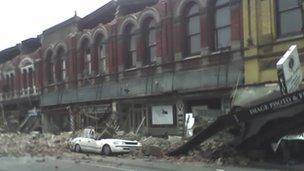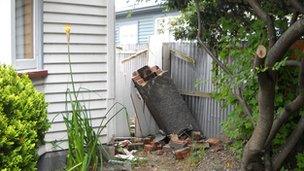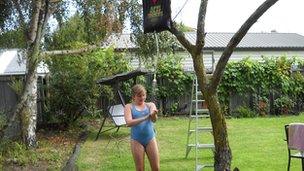Christchurch quake: 'We can't shake the worry'
- Published

The earthquake on 22 February 2011 left swathes of the city devastated
One year on from the powerful earthquake which struck the New Zealand city of Christchurch, residents are still struggling to get back to normal.
The earthquake killed 185 people and caused extensive damage to buildings and infrastructure.
Graham Crook, originally from Lancashire in the UK, looks back on the day the earthquake struck and reflects on how his family have coped since then:
"My family and I have lived in New Zealand for five years and were very happy before the earthquake struck.
"We settled in well here, hoping to show our children a different way of life to that in the UK. My wife found a job as a teacher and I started a small business in telecommunications.
"Then the September earthquake hit. Fortunately that happened in the early hours of the morning so most people were in bed. There was a lot of damage, but no-one was hurt.

Moments after the earthquake struck, Graham captured this image of a crushed car
"Then the big one hit in February. That was the one that changed everyone's view.
"I was in town at the time with my son. We were about to cross the road and I suddenly felt it. I had two seconds to decide whether we should run into or away from the nearest shop. We went into the shop - and that was the right decision.
"Outside in the street masonry began to fall and a car across the road was crushed by a falling block of concrete.
Dust-cloud
"I think if we had crossed the road about 20 seconds sooner, we would both have been killed.
"Afterwards the street was completely chaotic. There was a massive dust cloud. Some people were walking around - dazed and in shock. Some were crying hysterically. Others immediately got stuck in and started to help.

'Our house looked like a giant pair of hands had picked it up and shaken it around'
"The police were fantastic - they arrived on site within 10 to 15 minutes and told us to leave once they had got their effort co-ordinated.
"I distinctly remember one police officer telling a sobbing woman to go home. She pointed at a building which had been reduced to rubble and said: "That's home".
"What should have been a 10-minute drive home took us two hours. There was water springing up all over the place and sand had been deposited everywhere because of the liquefaction, which is silt deposits caused by the earthquake.
"When we got home, my wife was hiding under the kitchen table, where she'd been for two hours. She was absolutely terrified.
"Our house looked like a giant pair of hands had picked it up, shaken it around and then put it back down again. My wife said that some items had been thrown six or eight feet in the air.
"Fortunately our suburb wasn't as badly hit as some, but the infrastructure was severely damaged and many of us are still on water restrictions.
"There are some suburbs which have been completely wiped out. The land is unstable and the remaining houses will have to be demolished. Whole communities have gone.

Graham's family used a camping shower to wash while the authorities worked to restore running water
"The Red Cross has given grants to some people, and insurance has helped. For suburbs which have been denoted as an 'amber zone', meaning that some houses may have to be demolished, residents are unsure of what will happen to them and are frustrated.
"We didn't have water for two weeks. My wife is a girl-guide leader and we rigged up a temporary camping shower in the garden while we waited for running water to be restored. During that time our toilet was a bucket in the garden shed.
'Fearful'
"We can't shake the feeling of insecurity.
"Last week we were disturbed four times during the night by aftershocks. They may not be huge, but they are enough to wake you up and make you constantly feel the threat of another earthquake.
"My daughter is only 13 years old and she has rearranged her room so that she can make a quick escape should there be another earthquake. A lot of her thinking revolves around the possibility of a quake.
"My wife is fearful that there will be another earthquake and that we will all be in different places, unable to get back to each other.
"I have lost my business and have had to find another job. My wife works as a teacher in hospitality, relying on a dwindling influx of foreign students.
"Last week it almost looked as though she would lose her job. That's just been one more worry on top of everything else.
"The authorities are installing a warning system on the east coast of New Zealand as the centre of the earthquakes seem to be moving towards the sea. That indicates that they are worried there could be a tsunami.
"Most of us are fairly certain that there will be another earthquake."
Interview by Susannah Stevens
- Published9 February 2012
- Published2 September 2011
- Published23 August 2011
- Published20 June 2011